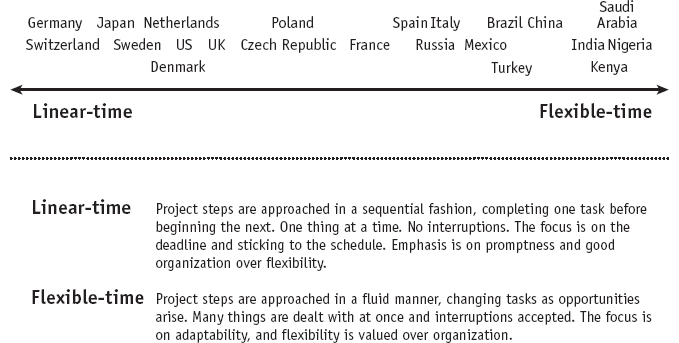调整中
柏青哥
这周课上阅读的主题是Form and Diaspora,Dictee和Interior Chinatown都非常抽象,于是想要找一些相似主题但是更容易读的书,李敏金的《柏青哥》是很完美的选择。这本书讲述了四代人,从朝鲜到日本的故事。
以下有大量剧透。
“杨金——顺子——诺亚&摩撒——所罗”这四代人每代人的经历都不同。杨金经营民宿,顺子大着肚子辗转东瀛,卖糖果卖泡菜,诺亚想要成为真正的日本人,而所罗想要成为美国人。
关于顺子,顺子是全书的核心,她的勇敢坚定让人由衷佩服,她对于家人关爱和忠诚也令人感动,是平凡又伟大的女性角色。尤其对于两个孩子,她是真真切切掏心掏肺:
“诺亚和摩撒,他们是我的命根子。”
高汉秀点点头。他对他的孩子从没有这种感觉。从来没有。
“我活着,都是为了他们。”
这么说是不对的。在教堂里,牧师在讲道时讲过,母亲们太过关心自己的孩子,崇拜家庭就跟崇拜偶像差不多。牧师说,一个人不能爱自己的家庭胜过爱上帝。牧师说,家庭永远不会给你只有上帝才能给予你的东西。但是作为一个爱孩子的母亲,有助于理解上帝的经历。诺亚现在有了自己的孩子,也许他能理解她为什么视他为生命。
她和高汉秀的纠葛是无法解开的,他们对彼此都有留恋,因为诺亚他们也不会分开,但是却也不会结果。
“你和我……我们是好朋友。”他平静地说,“我们将永远是好朋友。诺亚永远都是我们的。”
在朝鲜和白伊萨结婚的时候,她被盘问:
申牧师对顺子说:“是你把这种情况强加于你自己的,是这样吗?
白伊萨是传教士,是一个善良的好人,知恩图报,她受到杨金的照顾,所以决心要娶怀着别人的孩子的顺子,并且带她到日本去投奔兄长,他为了家庭压抑自己的革命热情,但是最后还是枉受牢狱之灾。
这些理想似乎都变成次要的了。他必须考虑到别人的安全。
自此之后,兄长白约瑟成为家里的骨干,他则是有一股大男子主义。
这两个女人都试着用不服从来服从白约瑟,她们不想反抗他而伤害到他,但一个男人不可能独自承担家里的开支
关于高汉秀,这个负心的男人使得顺子怀孕才告诉她他在日本有家室,他觉得可以让顺子做她在朝鲜的夫人,但是顺子的骨气宁可饿死也拒绝。高汉秀还是爱着顺子的,甚至可能比起他日本的妻子更爱顺子,但是他们两个人之间的隔阂已经没有办法弥补了,到晚年两个人也不再相见。但是如果她没有怀高汉秀的孩子,也就不会和白伊萨结婚到大阪去,更不会重新开始新生活。
他对于诺亚还是有怜爱之情,男人的这种情感让我觉得很好笑,仅仅是因为“他是我的孩子”的信念,既没有怀胎之苦,也没有肌肤之亲,居然也生出所谓的“父爱”,难道只是看到长得像自己所以觉得像照镜子一样?你家果真是有什么皇位吗,还是全能自恋?无论如何,他帮助了顺子一家是真,尤其是他帮助杨金来日本、让金汉昌招顺子做泡菜、资助诺亚上大学,都是实打实的好事。对这个人的评价是复杂的。
关于诺亚。诺亚考上了早稻田,但是还是和他没有好好读书的弟弟一样经营柏青哥店。他身上的负担无疑是比弟弟更重的,关于血统的自卑,作为高材生的骄傲,饱读诗书却沦落江湖的反差,这些矛盾在他身上集中爆发。
诺亚在顺子拜访后自杀给我特别多的震撼,在文中用一种几乎是平静的方式写了出来。
“你不该见他的。”
“很好啊。他下周来横滨。摩撒一定很高兴。”
高汉秀让司机开车。他听她讲述他们见面的细节。
那天晚上,诺亚没有给她打电话,她才意识到,她并没有把横滨家里的电话号码给他。第二天早上,高汉秀打电话给她。在她离开诺亚办公室的几分钟后,他就饮弹自尽了。
对于诺亚来说,承认自己的黑帮的血脉而不是牧师的儿子是一种信念的崩塌,在他努力融入日本人之后,母亲的出现让她无法承受,无法承受自己会重现变成被歧视的朝鲜人的事实。
书里面出现了很多种类不同的男女情感,除了上述的顺子和高汉秀,还有其他几对令人寻味,白约翰和庆熙是相守相辅,摩撒和由美,所罗和菲芘,而诺亚在大学时的情人把他当作一个谜题:
她的情人是她最喜欢的谜题。然而,她问得越多,他就越沉默寡言。当他简洁地回答她时,她总是习惯性地说一句“真的吗?”仿佛他这辈子遇到的事都很不可思议。她对他的一切都很感兴趣,但诺亚不想让她着迷。他只想和她在一起。就算她的注意力在陌生人身上,他也不介意;听她试图揭开别人的神秘面纱,要有趣得多。
她不能把他当成一个人,而诺亚意识到,他最渴望的就是别人把他当成一个人
关于民族,第三章的开头引用了一句话:
我对民族的定义如下:它是一个想象中的政治共同体,并且,它被想象为本质上是有限的,同时也是享有主权的共同体。
它是想象出来的,因为即使是最小民族的成员,也永远不会认识他们的大多数同胞,不会遇见他们甚至听说过他们,然而,他们互相联结的意象却存在于每一个成员的心中……
民族被想象为有限的,因为即使是最大的民族,就算他们或许涵盖了十亿个活生生的人,他们的边界,纵然是可变的,也还是有限的,而界限之外便是其他民族……
民族被想象为拥有主权,因为这个概念诞生时,启蒙运动与大革命正在毁坏神谕的、阶层制的皇朝的合法性……
最后,民族被想象为一个共同体,因为尽管在每个民族内部都可能存在普遍的不平等与剥削,民族总是被设想为一种深刻平等的同志情谊。最终,正是这种友爱的关系在过去两个世纪里,驱使数以百万计的人甘愿为民族这个有限的想象去屠杀或从容赴死。
——本尼迪克特·安德森
和所罗的家人在一起时,他们说三种语言。菲芘与长者说朝鲜语,与所罗说英语,而所罗则主要用日语与长者交谈,用英文与菲芘说话;每个人都会翻译一点点,用这种方式倒也不错。
我的家庭里也有几个脱离父母文化的,所以我应该很有发言权,刚好昨天刷到小红书有人问为什么香港小孩在家也说英语。孩子成长的两个关键环境是家庭和学校,所以对于我知道的香港学生,家庭语言是广东话、普通话或者闽南话等,而学校里则是广东话或者英语。在我的兄姊成长的期间,家庭环境是缺失的,或者有其他的替代(例如教会),但是都不是讲普通话的,所以他们虽然能说国语,但是也仅仅是说,没有经过读写汉语的教育。
我们去博物馆的时候,我看到曹禺的《雷雨》初版封面,说我真的很喜欢这部剧,但是她却是没有听说过的了。曹禺是高中课本里一定会学到的,所以我当时的反应是震惊,因为就算她不在内地上上学毕竟也在香港生活了二十年。但是转头一想对于外国人来说,除非是对中国戏剧感兴趣,否则不知道也正常。
他们对于中国社会有距离,我认为最大的距离出现在语言上,因为就算他们能讲,但是他们缺乏的是文化语境,是语言背后的动机。我读的书不算多,《左传》到《浮生六记》,“四书”到纳兰性德,历史是不断的重演,社会是反复的循环,但是在缺乏语境的时候,你不知道自己在演什么,从而显得孤立无援,因为你不知道思维和文化的根源。而在我的视角看过去,无非只是某时某处发生过的事情了,所以突然有一天就能看开了,有些东西也不是那么重要了。
当然,英文教育提供了基于西方的语境,所以或许对于希腊罗马和莎士比亚狄更斯他们兴许比我了解得多,但是我也在弥补了,我也是能在全是phd的古典学课上硬着头皮发表了。也因为这些阅读,我也发现了和原生家庭的距离。因为爱读的书不一样,所以我们的认知也会出现差异,当人想得深远,就没有回头路了。
话说回来,菲比作为朝鲜裔,对于大家庭是存有幻想的,她形容她分散在美国的亲人们:
她的大家庭却像一大桶不配套的乐高积木
因为当代核心家庭的结构的普遍化,所以小家庭之间的联系变得疏远,再加上地理距离的遥远,家庭文化结构也逐渐疏远,会让人怀念过年“热热闹闹”的氛围,就像四年前在老家过年一样。但是家里老人去世之后,这个家就迅速分崩离析了,罗马不是一天建成也不是一天倒塌的,关系的恶化是长期积累的,只是碍于长辈面子无法爆发,一旦不需要照顾面子,也就不计后果了。国家的长治久安需要经营,而不是祈愿,就算是血缘也没办法把互相憎恶的两个人天长地久地锁在一起。
如果说摩撒的阶段还只是想要归化日本,那么所罗则是对美国充满幻想,觉得去了美国所有的病都能治好,所有的烦恼都会消失。发达国家的前提是对殖民地的剥削,而幸运的小孩是几代人的努力积累,我是很幸运的那个。类似文中的故事,我祖辈一边是中专(其实当年考上了地质大学但是没钱去)一边务农经商,父辈都复读一年然后考上了对标今天211的院校,在下则在高考机器里卷了十年到今天,就像顺子到诺亚早稻田再到索罗读藤校一样,都不仅仅是一代人的努力。但是每一代的飞跃的代价都是和上一代观念的碰撞:
两个女人明白她母亲很忙,工作很辛苦,但她们无法想象一个朝鲜母亲不为家人做饭。如果所罗娶了这个女孩,他吃什么呢?他们的孩子吃什么?
菲芘是看得清的:
这是一个肮脏的世界,所罗。没有人是干净的。生活让你变脏
菲芘知道知道爱不能战胜一切,她知道她最终是属于美国而不是日本,所以她要她自己的生活,而所罗选择了父亲摩撒的柏青哥产业。父亲一开始是拒绝的,因为他觉得这不是让人尊敬的行业,但是或许所罗看得更大——更大的产业蓝图,更远大的前景。
第二天一早,菲芘就离开了。这就好像菲芘要来个干净的了断。所罗带她乘火车去机场,虽然他们很愉快,但她一夜之间就变了样。她看上去既不伤心也不生气,她很亲切。如果说有什么不同的话,那就是她似乎比以前更坚强了。她让他拥抱她告别,但他们说好在未来很长一段时间都不要联系。
“那样更好。”她说,所罗感觉无力反对她的决定。
所罗乘坐火车前往横滨。
他知道她的心是自由的,他的也是。
文章的结尾是顺子给白伊萨扫墓,发现诺亚消失的几年里其实都有来看白伊萨,而且还想给守墓人送书:
顺子现在感觉和白伊萨很亲近,这在他活着的时候是没有的。他在世时,她一直对善良的他又敬又畏。他死了,她觉得他更亲切了。
最后吐槽一些有趣的地方:
杨金民宿里的男人高谈阔论:
钟氏兄弟大字不识一个,但他们在码头上仔细听新闻,喜欢在民宿的餐桌上分析国家的命运。
金汉昌让顺子来做泡菜的时候说的我觉得很有道理:
顾客需要精致的小菜,这样才能感觉自己像个国王一样在用餐。
最后,你的肚子就是你的天皇。
固执的朝鲜人:
在这一点上,他们和朝鲜人完全一样,只是朝鲜人的固执比较低调,很难被发现。
固执的日本人有一万个理由:
“如果我卖掉游戏厅,会怎么样?他们可能炒掉我的员工。我的老员工能去哪里呢?而且,有了我们,制造游戏机的人才有工作。柏青哥在日本的业务量比汽车制造业还大。”
使女的故事
虚构的基列国,苦痛的使女,不堪回首的过去,虚伪的大主教,层层禁锢的女性。
看到学校大张旗鼓宣传Margaret Atwood来学校访谈,还是和我校最出名的古典学家Emily Wilson一起,查了一下才发现是赫赫有名的《使女的故事》的作者,几十年来耕笔不辍,著作颇丰,没想到能有幸亲眼见证传奇,兴盛至哉。

当天到了才发现忘记预约门票,大礼堂里坐得满满当当,她一出来我前后左右的女生都在说so cute
一些访谈记录:
问:作家如何高产
答:活久点 别抽烟(老太太生于1939)老太太梗特别密集,听完宛如脱口秀。
Emily说自己小时候过圣诞读荷马,老太太说你居然圣诞节读荷马。
老太太还讨论了关于不同人称在小说写作里的使用,尤其是选择视角受限的第一人称、视角受限的第三人称还是上帝视角第三人称。第一人称有可能欺骗读者,比如在推理小说里,到结尾才发现原来第一人称的“我”才是杀人真凶
问:为什么你涉及的种类如此广泛,既有小说诗集又有非虚构还有自传文学
答:因为我那个年代没有所谓的创意写作课程,没人告诉我写什么,我只好什么都写问:如果你创作过程中卡壳怎么办
答:所以你知道我那十几部诗集哪里来的吧老太太说,如果我们的当下不是当下,也或许是十七世纪英格兰的重现
访谈结束的时候,老太太还拉着Emily转圈圈,尤其可爱。
他说找不到与情同姐妹相对应的词,只能用拉丁语sororize(结为姐妹)这个词了。他喜欢对此类细节探本求源,如词语的派生、稀奇的用法等。我常笑他迂腐。
自由有两种,丽迪亚嬷嬷说。一种是随心所欲,另一种是无忧无虑。在无政府的动乱时代,人们随心所欲、任意妄为。如今你们则得以免受危险,再不用担惊受怕。可别小看这种自由。
她们都是自食其力、自主自强的女人。她们身穿前面有一排纽扣的衬衫,暗示着解开这个字眼随时可能发生。她们可以解开,也可以不解开。她们看起来有能力自行选择。当时我们似乎也能选择。丽迪亚嬷嬷说,从前那个社会毁就毁在有太多选择。
谦逊就是把自己隐藏起来,丽迪亚嬷嬷说。永远不要忘记。要是让人看到 ——要是让人看到 ——便意味着——她的声音发颤——能够被人看透。而你们,姑娘们,必须使自己成为看不透的人。她把我们称为姑娘们。
“这位游客问,你们快乐吗?”翻译说。我能想象得出,他们对我们有多么好奇:她们快乐吗 ?她们怎么可能快乐 ?我能感觉到他们亮晶晶的黑眼睛片刻不离我们,身子微微前倾,等着我们回答,女人们尤其如此,男人们也不例外:因为我们神秘莫测,不可接近,我们令他们亢奋。
奥芙格伦一声不吭。顿时出现一片静寂。有时不说话同样危险。
“不错,我们很快乐。”我喃喃道。我总得说些什么。除此之外,我又能说什么呢?所谓正常,丽迪亚嬷嬷说,就是习惯成自然的东西。眼下对你们来说,这一切可能显得有些不太正常,但过上一段时间,你们就会习以为常,多见不怪了。
再过半小时,我说。我有篇论文第二天要交。哪方面的?心理学、英语、经济学。那时我们学的不外乎这类东西。房间的地板上四处扔着摊开的书本,显得奢侈、铺张。
现在就走,莫伊拉说。不用往脸上涂脂抹粉了,就我和你。你的论文写什么?我刚写了一篇有关约会强奸的论文。
约会强奸,我重复道。你可真时髦,听起来就像一道甜点。枣油菜 。
哈哈,莫伊拉大笑,说,带上你的外套.
“约会强奸”和“枣油菜”在英文里均为date rape,为同形异义词。
我宁愿把这当作一个纯粹由我讲述的故事。我需要这么想。我必须这么想。只有能够把这些故事仅仅当作是故事的人才能看到更多的希望。倘若这是一个由我讲述的故事,我就能随意控制它的结局。那样,就会有个结局,故事的结局。真实生活将尾随其后。我可以在中断的地方重新拾起接续。
可它并非我正在讲述的故事。
也可以说它是我正在讲述的故事,随着我的生活,在我的脑海里进行着。
是讲,而不是写,因为在我身边没有可以书写的工具,即使有也受到严格禁止。但是,只要是故事,就算是在我脑海中,我也是在讲给某个人听。故事不可能只讲给自己听,总会有别的一些听众。即便眼前没有任何人。
讲故事犹如写信。亲爱的你 ,我会这样称呼。只提你 ,不加名不带姓。加上一个名字,就等于把你和现实世界连在一起,便平添了莫大风险和危害:谁知道你活下来的机会能有多少。因此,我只说你 ,你 ,犹如一支古老的情歌。你 可以是不止一人。
你 可以是千万个人。
我眼下尚无危险,我会对你说。
我会当作你听到了我的声音。
可是这无济于事,因为我知道你无法听见。“好可爱的五月天。”奥芙格伦开口道。我没有看她,但能感觉到她把头转向我等着我回答。
“是很可爱。”我说。想想我又添上一句:“感谢上帝。”五月天(Mayday)在很早以前,曾经是一场大战中使用的求救信号,这是我们在高中时学到的。我总是把那些大战混为一谈,不过只要稍加留意,还是可以通过每场大战使用的战斗机把它们分辨清楚。但有关Mayday的一些信息是卢克告诉我的。Mayday,Mayday,这个信号是战斗机被击中时飞行员使用的,它还用于海上航船——航船也使用这个信号吗?或许航船使用的是SOS。我真希望能去查个清楚。这个词是从贝多芬那里借用的,用来庆祝其中一场大战初战告捷。你知道Mayday来源于哪个词吗?卢克问。
不知道,我说。用这样一个词来当求救信号,有点怪怪的,你不觉得吗?报纸加咖啡,星期日的早晨,女儿降生之前。那时还有报纸。我们习惯在床上看报。
它来自法语,他说。来源于M’aidez这个词。救救我。
我还会再有机会呆在酒店客房里吗?我是如何挥霍了那些客房,那种逃脱睽睽众目的自由啊。
租来的放纵。
我们生活着,一如既往,视而不见。视而不见不同于无知,你得劳神费力才能做到视而不见。
一切都不是瞬间改变的:就像躺在逐渐加热的浴缸里,你就是被煮死了自己也不会察觉。当然,报纸上不乏各种报道,水沟里或树林中的尸体,被大头棒连击致死、碎尸,或像从前常说的遭到强奸。但那些报道说的是别的女人,干这种事的男人也是别的男人。那些男人没有一个是我们认识的。报纸上的消息对于我们来说就像一场场梦,别人做的噩梦。多可怕呀,我们会说。它们确实可怕,但可怕的同时又觉得难以置信。它们过于耸人听闻,它们带有一种与我们的生活迥然不同的特性。
我们不是新闻人物,我们生活在印刷字体边上无字的空白里。这个空间给予我们更多的自由。
我们生活在各种报道之间的空白里这些画像一直被当做色情画,我那时也这么认为;但我现在明白它们的真正内涵了。这些画表现的是假死状态;是等待,是闲置不用的物体。这些画表现的是百无聊赖。
但也许对男人而言,女人们的百无聊赖同样撩人。
在我们之间,接吻是不允许的。这使整件事变得可以容忍。
只要将自己与自己分离。只管叙说。
我坐在椅子里,想着chair(椅子)这个词。它也可以指会议主席。还可以指一种行刑方式:电椅。它又是charity(博爱)的第一个音节。这个词在法语里则意为肉体。所有这些之间毫无关联。
假如我有条件把这些事记下来,不管用什么方式,哪
怕是用向他人讲述的方式,这也是一种重述,又隔了一层的重述。想准确
无误地再现事件的原貌是不可能的,因为经由口中说出来的事永远不可能
与事件原样丝毫不差,总难免有所遗漏。太多的盘根错节,方方面面,纵
横交错,差别细微难辨;太多的手势动作,含义可此可彼,暧昧不清。此
外还有太多根本无法充分诉诸语言的形状样式,太多充斥在空气中或依附
在舌头上的种种气味,以及太多其色难辨的混合色彩。倘若将来有朝一
日,你成了男人,并有幸出人头地,切记千万别受诱惑,产生作为女人理
当宽恕男人的想法。说实在的,这是一个难以抵抗的诱惑。不过请记住,
宽恕本身也是一种权利。祈求宽恕是一种权利,给予或是不予宽恕更是一
种权利,或许是最大的权利。Nolite te bastardes carborundorum
谷歌翻译出来的意思是:Do not let the bastards grind you down
那些杂志充斥着希望与承诺。它们介绍各种使人容貌焕然一新的手法,替人设计不计其数的各种可能,这些可能伸展开来,就像面对面摆在一起的两面镜子里的映像,不断延伸扩展,一个又一个地呈现对方的影子,直至消失。它们向人提供一个又一个的冒险经历,一个又一个的衣橱,一种又一种的美容术,一个又一个的男人。它们让人看到青春可以再来,美貌可以永驻,痛苦可以征服、超越,爱情可以绵绵无尽。那些杂志给人的真正承诺是永恒与不朽。
因为他一定清楚,回忆过去的时光对我来说是一件多么痛苦的事。
毕竟我们还有……他说着又住了口,没有提我们还有什么。我忽然想
到他不该说我们 ,因为就我所知,他并未被人剥夺走什么东西。
毕竟我们还彼此拥有,我说。这是实话。可为什么我的语气听起来,
连我自己都感觉到,如此淡然冷漠?
于是他开始吻我,好像我这么一说,一切便回到正常轨道。可是某些
东西还是改变了,某种平衡。我觉得整个人在缩小,当他搂住我,拥我入
怀时,我缩成了玩具娃娃那么大。我觉得爱正抛弃我独自前行。对此他并不在乎,我心想。他根本就不在乎。甚至或许他还更喜欢这
样。我们不再彼此相属。相反,如今我属于他。
卑鄙可耻,毫无道理,虚假不实。但那却是实实在在发生的事实。
因此,卢克,此刻我想问你,并急需知道的是,过去我究竟是对是
错?我们从未涉及这个问题。在我有机会问的时候,我不敢启口。我舍不
得因此失去你“我会处置它 的,卢克说。他用的是它 ,而不是她 ,于是我知道他的意思是杀了它 。那是杀戮之前必不可少的环节,我心想。你得先造出一个物化的它,而那原先是不存在的。你得先在头脑里想象出来,然后把它真实化。他们杀人前一定是那么干的,我心想。过去我似乎对此完全一无所知。”
被出卖的那一刻是最可怕的。当你确信自己遭人背叛,确信你的同类对你满怀恶意的那一刻。这就好比乘在一台顶端钢缆被人砍断的电梯里。下坠,下坠,不知何时会撞击地面。
诱惑的含义远远不止吃睡。知即诱惑。或许我无意真想知道正在发生什么。或许我宁愿不知道。或许我知道了会无法忍受。人类的堕落便是从无知到知。
要炒蛋就得打破蛋,有失才有得,他这么说。我们以为可以创造一个更美好的社会。
更美好?我声音细弱。他怎么会认为这样更美好?
所谓更美好,并非对人人而言都是如此,他说。对某些人,它从来都意味着更糟。不喜欢就换一个,我们互相这么说,对自己也这么说。于是我们换掉那个男人,再找一个。我们相信,新的总是胜过旧的。我们是修正主义者,修正的是我们自己。
请你原谅。我是过去的难民,像所有难民一样,我常常会回忆起已经脱离或被迫脱离的原先的生存方式和习俗。那里的一切从这里的角度去看或许显得离奇古怪,而我则对之魂牵梦绕,念念不忘。如同二十世纪一位在巴黎街头喝茶的逃亡白俄。我徜徉在过去,一次次企图返回那些遥远的小径。我变得脆弱伤感,不堪一击,完全迷失了自己。默默流泪,是双泪长流,不是嚎啕大哭。坐在椅子里,泪水慢慢溢出眼眶,源源不断,就像一块挤不干的海绵。
就是这样。漫长的等待。等待中的女人,这是过去人们对孕妇服专卖店的称呼。听起来更像是某个在车站候车的女人。等待也意味着一处地点:也就是等待时所呆的那个地方。对我而言,就是这间屋子。这儿的我是一块空白,夹在不断插入的事件之间,夹在他人之间。“离别更增思念情。”我们引用的是过去夜场影片中的对白,而那些影片是更早时候拍的:这种对话可以追溯到很久很久以前,与我们所处的年代相隔久远。即便是我母亲也不这么说话,从我记事时就不曾有过。现实生活中恐怕没有一个人会这么说话,根本从一开始就是编造出来的。但这句伤感多情、苦中作乐的性调侃居然如此轻易就泛上脑海,真是令人不可思议。现在我终于明白它的用处了,明白它一直以来的用处:是为了把自己的内心包裹起来,保护起来,使他人无法企及。
我黯然神伤,因为我们的谈话方式无比悲凉:消失的音乐,褪色的纸花,褴褛的绸缎,回声的回声。一切都消失了,不可能再来。猛然间我失声痛哭。爱情所感受的向来只是大约情形。
更喜欢《使女的故事》的原因是其中蕴含的那种深深的怀念和淡淡的绝望,爱情如何在其中交织。让我想起了去年年底读的同人文绿窗和纸割,也是这样的两部作品,毋庸置疑我是更喜欢绿窗的,因为绿窗悬疑背后的爱也是如此刻骨铭心。
证言
比起《使女的故事》的感情,续作《证言》更多推理和猜测。等到一切都揭晓的时候让人茅塞顿开。
这本是在回城的飞机上看完的,听着Twice的Perfect World,感觉合适极了。
只有死人才能有雕像,但我还健在时就被塑成了雕像。活着的我就已被石化了。
信息就是权力,尤其是毁人名誉的信息。我不是第一个认识到这种价值,甚或瞄准机会以此兑现利益的人:全世界的情报机关都一向深谙此道。
这句话是《证言》的核心——秘密。
因为不是每个游荡在墓园的人都是精神稳定的。
“比如你。”我说。他没作答。我大概把他惹毛了。
而喜欢在墓地游荡的我的精神也不太……
她们的武器是强大却也肮脏的秘密,正如马大们一贯所说的那样。秘密,谎言,诡计,欺骗——但这其中不只有别人的秘密、谎言、诡计和欺骗,也有她们自己的。
如果我继续待在阿杜瓦堂——执行珍珠女孩的传教使命,归国后晋升为正式的嬷嬷——我就会变成这样。我获知的所有秘密——无疑还有别的数不胜数的秘密——都将变成我的武器,在我觉得合适的时机下随取随用。所有这一切权力啊。这种默默判决恶人、并以恶人无法预见的方式惩处他们的暗中势力。所有这一切复仇的力量啊。
就像我之前说的,我曾一度遗憾自己的内心有复仇的冲动。遗憾,但从没有被抹煞掉。假如说我没有受到诱惑,那就是没讲真话。
空中的鸟必传扬这声音
有翅膀的也必述说这事。
爱如死之坚强
这部电视剧尊重了小说艺术的一项公理:人类历史中没有先例的事件不准写进小说。
阿特伍德做了充分的功课,专门收集了二战集中营、焚书、克格勃、蓄奴制及美国内战前的地下铁道救助系统之类的历史资料,因而她屡次强调:书中所写到的一切迫害都是历史中确实发生过的。虽然她把故事设定在近未来,但不言自明的是:那些事也可能在未来重演。
问题在于:这个体制中的幸存者该如何打败这头怪兽?不要以为主教或眼目都是胜利者,他们只是死得比较慢的幸存者而已。所有人都(多多少少)知道基列所谓的真理是对宗教的曲解,是父权对平权的不顾一切的反噬,所有人都明白:最终起效的不是律法,不是真理,只是一时的暴力。从这个意义上说,阿特伍德在开拓了女性主义文学的同时呼吁的是真正的平权——作为专制暴力的对立面的男女平权。
“男性小说讲的是如何得到权力,谋杀啊,获胜啊之类的。女性小说亦是如此,不过途径不同
>
记者曾追问阿特伍德书名 Testaments 有何深意?她指明了三层意思:遗言、证词、遗命,《旧约》和《新约》,坦白真相。
>
基列的故事告诉我们:生活是很容易被操控的,因为生存所需的衣食住行终究是容易满足的:文盲可以生活得很好,甚至可以通过婚姻(无论真假)得到财富、荣誉和其它特权;平庸的恶人不仅能幸存,还可能存活得最久……有智力的人未必有理性,现代未必是文明的保证;判断力往往会屈服于生存的基本需求,但理性会让一个人在幸存所意味的屈辱隐忍乃至违背本心的同时,在内心保持自己的判断力,在受到迫害、继而规避迫害的同时策划反抗或复仇。
《善的脆弱性》一开始读的时候兴趣盎然,尤其是读序章的时候对后面的内容充满了期待,因为善良和脆弱这两个关键词都是我恨感兴趣的,但是第一章读完就痛苦不已,不知道是因为翻译还是因为本身的叙述方式。
有力的情感(主要包括怜悯和恐惧)就是关于好的人类生活的洞见之源泉
自由究竟是什么,什么样的自由对一个管理良好的国家最重要等问题上,现代思想毫无统一性
自由这个概念非常抽象
像悲剧诗人一样,他从来就没有把稳定性(或者对运气的免疫性)抬高为其他领域的价值必须服从的一个首要目的。因此他就继续在人类最重要的那些善中来赞颂友爱,甚至同时承认真正的朋友总是面临丧失和悲伤的危险。一种孤独的生活对他毫无吸引力,因为那种生活在价值上过分贫乏
脆弱性是某些人类真正的善的一个必要的背景条件
看起来像是一种严酷必然性的东西往往只是贪婪、懒惰和缺乏想象力的结果……灾难的原因究竟是永恒不变的必然性,还是恶意与愚昧
真正的人类爱情之美不同于两个不朽的神之间的爱情,不同之处也不仅仅是时间上的长短
尼采的注释:“希腊人最重要的特征之一就是他们没有把自己最杰出的东西转化为思想
要留给后人解释空间,理论需要原料,也需要发展
单单理性本身不足以真正地理解爱或者是悲剧。阿伽门农从头至尾都“知道”伊菲革涅亚是他的孩子
朋友”(philos)和“敌人”就完全是从家庭关系出发来定义的。[41]当安提戈涅说“我的本性是去爱(sumphilein),而不是去恨”时,她并不是指一般意义的爱,而是指对家庭的爱(philia)。这种爱的本质是不管人的好恶与欲望所求,而要求行动者一味地忠实于爱的承诺。这种爱不需要人做决定;而其中的关系很少牵扯到个人喜好
献给阿尔吉侬的花
是我的两个好朋友读过并且推荐的书,不过她们读的是长篇小说,我读的是获得雨果奖的中篇版本,比起说是科幻,更多是借着科幻的外壳讨论人性,就像《使女的故事》很多时候也在科幻的分类底下一样。
我就像个一生都在半睡半醒间的人,拚命想知道自己清醒过来之前的模样
新药物的开发需要谨慎的三轮临床,双盲实验,而像文中一样研究者和实验对象直接沟通是不可能的,比如之前的基因编辑婴儿受到的谴责就是一个例子,克隆人也不完全是技术问题,而是一个更大的伦理问题。
这篇作品在叙事上体现得很好的是一种张力,从开头的白痴到中间的天才,又到结尾的重归原点,这样的起落展现出了一种落寞和无力感,和阿尔吉侬之间的小小温情,和两位女性之间的关系,让小说除了冰冷的科学实验之外也有人性的光辉。
Goodbye to All That
I have a whole thousand-word diary discussing what NYC is about for me. To summarize, NYC is a big theme park two-hour bus ride or one-and-a-half-hour train ride for me. Because of a certain fanfic work, it means a lot of sentiments and emotion. Broadway is best. Crazy and crowded. Difficult to live. Would definitely come back.
All I mean is that I was very young in New York, and that at some point the golden rhythm was broken, and I am not that young anymore.
—Joan Didion, “Goodbye to All That,” Slouching Towards Bethlehem
schmaltzy sentiment
I started to love that apartment so much that it grew painful to think of leaving it so soon. I had no choice but to stay and hope that I would come to love the neighborhood, too. I did
Every corner, every surface, exposed reminders of who was gone, where I’d never noticed anything before. The greatest of all cats—she, too, was gone by then, but the phantom of her jumped on the bed many mornings, as if to wake me for her phantom breakfast.
although it was strange and stunning to see how quickly what had taken me two decades to fill with things that gave me pleasure, to make a home, could be emptied, it didn’t make me sad. I was happy to be leaving, and I was ready. I was more than ready—I was late. It should have happened sooner
Afterward, I often wondered if I’d told myself the truth.
More than anything, New York was seeing people, so many different people, so many beautiful shades of brown, so many different voices,
If you lived in New York long enough, you got obsessed with space: how to find more of it magically hidden within the limited space you had.
What feels like home to you in this infinite city?
I just couldn’t really afford to, or even the loneliness of having too many acquaintances and not enough friends. It was the loneliness of wanting to write and not writing. I tried. I tried to wake up early or stay up late. But it all felt perfunctory and dead on the page. It mainly just made me tired.
In New York, most of the people I knew seemed to define themselves not by what they made but by what they consumed:
What did they say about a New York minute? Everything could change. Here, the creative process wasn’t insular and rarefied. It was expedient and pragmatic, directed toward an immediate concrete end. Writing got made. Like a widget. It wasn’t conjured, and it certainly wasn’t perfected.
Now I look back and recognize the truths that weren’t about loneliness at all but rose from the sudden joy of getting a sentence right or nailing a moment of dialogue
New York had taught me many times, in many ways, that life never plays out in exactly the ways we imagine. But what we get—in fragments, distortions, faint approximations—has its own beauty. New York kept trying to teach me that a life can look far more coherent from the outside than it actually feels from within—the most obvious truth in the world, I guess, but who ever really grasps it
Leaving gets harder as you age. You don’t leave out of anger or from coming to your senses but because your love is not as strong as your reasons for going.
“Change is scary, but it doesn’t mean it’s wrong.”
In these emptier days, I have come to know that my sadness is not a problem to be solved. It is simply my humanity. Sometimes pain is the call of a wound that needs tending, and sometimes it is the sting of its healing. And sometimes you have to break your own heart to be true, and you have to go home to do it.
Like a relationship you know is over, and still you go on kissing each other on the cheek and silently grinning through your teeth because how can it possibly be over, a love as big as this
I learned how to cope when a lover commits suicide. New York City during my college years was like being enrolled in Heartbreak, Sex, and Death 101.
I was unlearning things, too. Unlearning how to drive, unlearning what was acceptable and unacceptable behavior
I was getting tired and I was only twenty-three. The sun was too harsh, yet I became even paler each year. I grew uncomfortable looking people in the eye
I was terrified that I would come to hate New York.
I didn’t feel safe around myself in New York. I never knew what I was going to do.
I used to think that every eventful thing that happened in my life would feel as good as moving to New York City did, that my life would be like moving to New York, over and over and over again. I know now that as with falling in love, you’re lucky if it happens to you even once.
It is strange to think you can have a spiritual home even before you have ever been there. But some places are so iconic—the Taj Mahal, Paris, the moon—it is possible to know them from afar. That was New York for me
A Wall Street salary allowed me one of those 1970s cookie-cutter high-rises, across the street from the Merkin Concert Hall, the name I secretly smiled at every day (look up “merkin” if you haven’t read Valley of the Dolls). The apartment was a studio sloppily bisected by a fake wall to make it into a one-bedroom. It made the space smaller, but I liked having another room to go into.
Actually, as with the addict who still dreams of the lingering taste of the forbidden, that upswelling feeling—of happiness, of unobserved observation, of the strangest kind of normalcy—came back with a rush, even staying in the tourist trap that is Times Square. Yes, I had quit New York, but it hadn’t quit me
11. FONDLY, MARIELisa Ko
anonymity
14. SOMEDAY, SOME MORNING, SOMETIMEEmma Straub
The city isn’t theirs, and they aren’t its people—they’re interlopers, long-form tourists, around long enough to be able to tell their children stories about when they lived in New York, lo those many years ago
14. SOMEDAY, SOME MORNING, SOMETIMEEmma Straub
the way New York City looked from the middle of the country, like some haughty socialite obsessed with her own reflection.
I spend a little time every day looking at real estate listings on the internet, telling myself, It would only be for a little while. I wouldn’t stay away for the long run. How could I? Could I?
That’s the problem with being born in New York… You’ve got no New York to run away to
as Didion writes, “it is often said that New York is a city for only the very rich and the very poor,” it could also be said that “New York is also, at least for those of us who came from somewhere else, a city only for the very young.”
comfortable at first, familiar, but then you remember why it didn’t work out and all the things that drove you crazy. Why
If you lose your facility with New York, like a language once deciphered, it covers itself over again, becomes incomprehensible through disuse.
New York never fundamentally changes; you do. The city is always here if you need it—one big giant laboratory, aflame with bright lights and tests and trials.
The Culture Map
Interesting and important for a new-comer of a MNC.
In a French setting, positive feedback is often given implicitly, while negative feedback is given more directly. In the United States, it’s just the opposite. American managers usually give positive feedback directly while trying to couch negative messages in positive, encouraging language
Summry: The eight scales
• Communicating: low-context vs. high-context
• Evaluating: direct negative feedback vs. indirect negative feedback
• Persuading: principles-first vs. applications-first
• Leading: egalitarian vs. hierarchical
• Deciding: consensual vs. top-down
• Trusting: task-based vs. relationship-based
• Disagreeing: confrontational vs. avoids confrontation
• Scheduling: linear-time vs. flexible-time
Notice that the scales are based on cultural relativity
i.e. relationship-based in comparison to your own culture
Encountering foreign culture:
All of us have a deep protective instinct for the culture we consider our own, and, though we may criticize it bitterly ourselves, we may become easily incensed if someone from outside the culture dares to do so
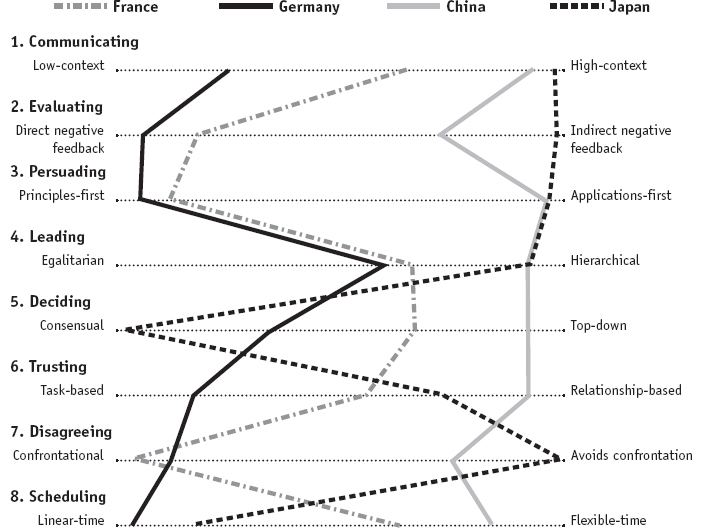
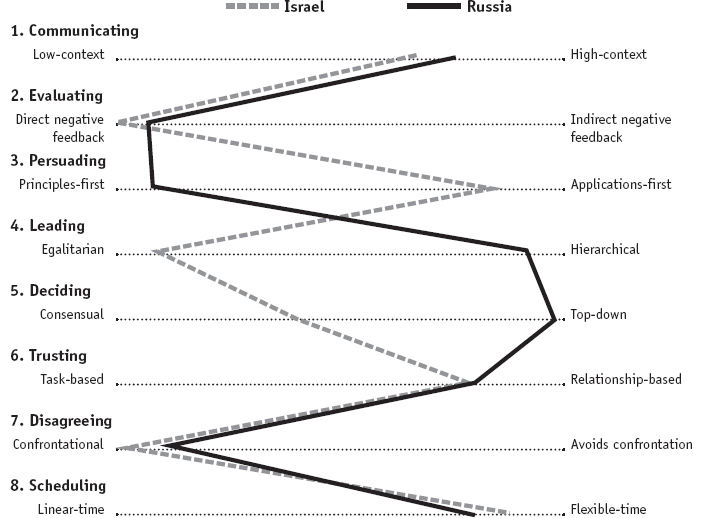
1. Communicating
By contrast, in many Asian cultures, including India, China, Japan, and Indonesia, messages are often conveyed implicitly, requiring the listener to read between the lines. Good communication is subtle, layered, and may depend on copious subtext, with responsibility for transmission of the message shared between the one sending the message and the one receiving it
The United States is the lowest-context culture in the world, followed by Canada and Australia, the Netherlands and Germany, and the United Kingdom.
In a high-context culture like Iran, it’s not necessary—indeed, it’s often inappropriate—to spell out certain messages too explicitly.
English, then, is a lower-context language than the Romance languages descended from Latin
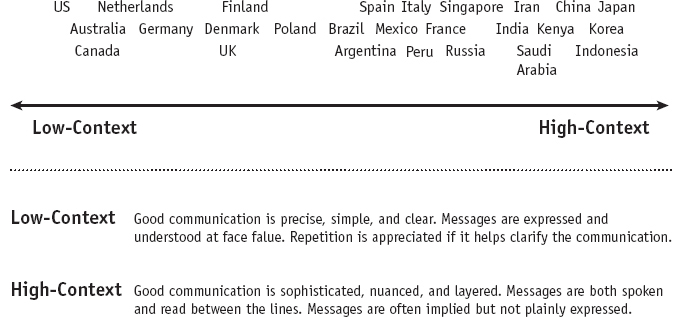

On the left, you see the Anglo-Saxon cluster, followed by the Romance language cluster, and finally, furthest to the right, is a cluster of countries speaking Asian languages.
the British speak more between the lines than Americans do, a tendency particularly apparent with British high-context humor.
“It is important not to form opinions too quickly,” Díaz suggests, “to listen more, speak less, and then clarify when you are not sure if you understood.
• One person would recap the key points orally, with the task rotating from one team member to another.
• Each person would summarize orally what he would do next.
• One person would send out a written recap, again on a rotating basis.
Organizational charts (showing on paper who works for whom)
• Titles (describing exactly who is at what level)
• Written objectives (explaining who is responsible for accomplishing what)
• Performance appraisals (stating in writing how each person is doing
2. Evaluating
Getting negative feedback right can motivate your employees and strengthen your reputation as a fair and professional colleague.
Evaluating Performance and Providing Negative Feedback
More direct cultures tend to use what linguists call upgraders, words preceding or following negative feedback that make it feel stronger, such as absolutely, totally, or strongly: “This is absolutely inappropriate,” or “This is totally unprofessional.”
more indirect cultures use more downgraders, words that soften the criticism, such as kind of, sort of, a little, a bit, maybe, and slightly. Another type of downgrader is a deliberate understatement,
“Anglo-Dutch Translation Guide”
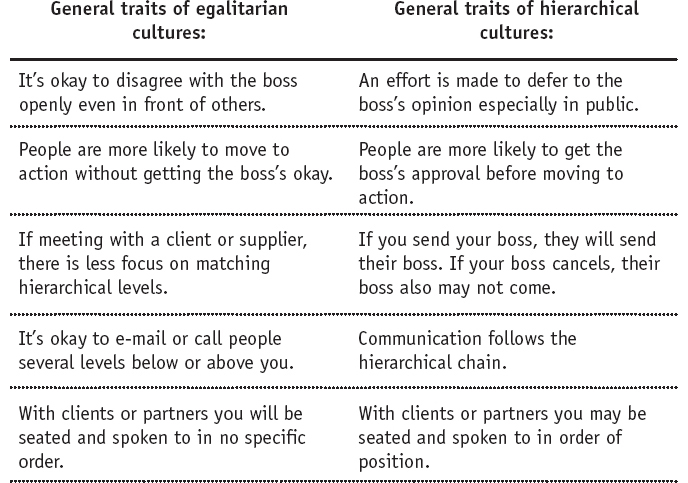
One rule for working with cultures that are more direct than yours on the Evaluating scale: Don’t try to do it like them.
follow a few simple strategies to work more effectively with people from quadrant C (that is, Americans, British, and Canadians).
First, when providing an evaluation, be explicit and low-context with both positive and negative feedback. But don’t launch into the negatives until you have also explicitly stated something that you appreciate about the person or the situation
Second, try, over time, to be balanced in the amount of positive and negative feedback you give. For example, if you notice something positive your colleague has done on Monday, say it there and then with explicit, open appreciation. Then, on Tuesday, when you need to severely criticize the same colleague’s disappointing proposal before it is sent to the client, your comments will be more likely to be heard and considered rather than rejected out of hand.
Third, frame your behavior in cultural terms. Talk about the cultural differences that explain your communication style. If possible, show appreciation for the other culture while laughing humbly at your own. Someone in Dulac’s position might say, “In the U.S., you are so good at openly appreciating one another. In France, we aren’t in the habit of voicing positive feedback. We might think it, but we don’t say it!”
quadrant D as shown on page 72, negative feedback is generally soft, subtle, and implicit
But blurriness can be highly effective in many Asian cultures if it is used skillfully and appropriately, as I discovered early in my career.
strategies for blurring the message
The first strategy: Give the feedback slowly, over a period of time, so that it gradually sinks in
second strategy: Use food and drink to blur an unpleasant message
we are relaxed, this is a good time to give feedback. We don’t make reference to it in the office the next day or the next week, but the feedback has been passed and the receiver is now able to take action without humiliation or breaking the harmony between the two parties
Aini’s third and final piece of strategy baffled me at first. She urged me: Say the good and leave out the bad
3. Persuasion
Principles-first reasoning (sometimes referred to as deductive reasoning) derives conclusions or facts from general principles or concepts [Anglo-Saxon]
VS
applications-first reasoning (sometimes called inductive reasoning), general conclusions are reached based on a pattern of factual observations from the real world [Latin Europe (France, Italy, Spain, Portugal), the Germanic countries (Germany, Austria), and Latin America (Mexico, Brazil, Argentina) tend to emphasize this method of teaching.]
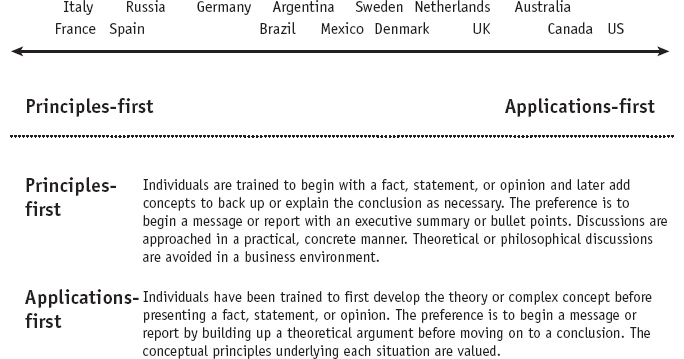
Different cultures have different systems for learning in part because of the philosophers who influenced the approach to intellectual life in general and science in particular.
The British and American systems are based on common law, in which a judgment in one case sets a precedent for future cases—a clear example of applications-first thinking.
By contrast, most European Union states use the civil law system that originated in Roman law and the Napoleonic Code, in which a general statute or principle is applied on a case-by-case basis, mirroring the principles-first approach. Interestingly, Scandinavia uses a hybrid legal system that does not fall neatly into either camp. Note the middle position of the Nordic countries on the Persuading scale.
If the performance of your global team is suffering because its members are operating at different ends of the Persuading scale, consider the following strategies:
• Build team awareness by explaining the scale. Have everybody read this chapter and discuss it during a team meeting.
• A cultural bridge can help a lot. If you have team members who are bicultural or have significant experience living in different cultures, ask them to take responsibility for helping other team members.
While the Americans mentioned larger, faster-moving, brightly colored objects in the foreground (such as the big fish visible in the illustration), the Japanese spoke more about what was going on in the background (for example, the plants or the small frog to the bottom left). In addition, the Japanese spoke twice as often as the Americans about the interdependencies between the objects up front and the objects in the background. As one Japanese woman explained, “I naturally look at all the items behind and around the large fish to determine what kind of fish they are.”
Chinese people think from macro to micro, whereas Western people think from micro to macro.
Sometimes, it is simply better to leave Rome to the Romans.
4. Leading
Countries that fell under the influence of the Roman Empire (including Spain, Italy, and, to a lesser degree, France) tend to be more hierarchical than the rest of Western Europe
Vikings were surprisingly egalitarian. The countries most influenced by the Vikings consistently rank as some of the most egalitarian and consensus-oriented cultures in the world today.
Countries with Protestant cultures tend to fall further to the egalitarian side of the scale than those with a more Catholic tradition.
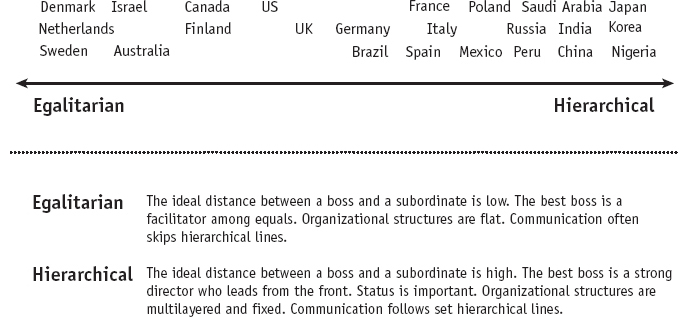

hierarchical society:
• Communicate with the person at your level. If you are the boss, go through the boss with equivalent status, or get explicit permission to hop from one level to another.
• If you do e-mail someone at a lower hierarchical level than your own, copy the boss.
• If you need to approach your boss’s boss or your subordinate’s subordinate, get permission from the person at the level in between first.
• When e-mailing, address the recipient by the last name unless they have indicated otherwise—for example, by signing their e-mail to you with their first name only.
an egalitarian society:
• Go directly to the source. No need to bother the boss.
• Think twice before copying the boss. Doing so could suggest to the recipient that you don’t trust them or are trying to get them in trouble.
• Skipping hierarchical levels probably won’t be a problem.
“How can I make good decisions if I don’t know what my group really thinks about an issue?”
Ask your team to meet without you in order to brainstorm as a group—and then to report the group’s ideas back to you. Removing “the boss” from the meeting removes their need to defer, allowing people to feel more comfortable sharing ideas.
• When you call a meeting, give clear instructions a few days beforehand about how you would like the meeting to work and what questions you plan to ask. Tell your team members explicitly that you will call on them for their input. In this way, they can show you respect by preparing and sharing their ideas. It also gives the team members time to organize their thoughts carefully and to check with one another before the meeting.
• If you are the boss, remember that your role is to chair the meeting. Don’t expect people to jump in randomly without an invitation. Instead, invite people to speak up. Even if team members have prepared well and are ready to share their ideas, they may not volunteer unless you call on them individually. When you do so, you may be surprised to see how much they have to contribute.
5. Deciding

In a consensual culture, the decision making may take quite a long time, since everyone is consulted. But once the decision has been made, the implementation is quite rapid, since everyone has completely bought in and the decision is fixed and inflexible—a decision with a capital D, we might say. Thus, the moment of making the decision is taken quite seriously as the pivotal point in the process.

By contrast, in a top-down culture, the decision-making responsibility is invested in an individual. In this kind of culture, decisions tend to be made quickly, early in the process, by one person (likely the boss). But each decision is also flexible—a decision with a lowercase d

THE JAPANESE RINGI SYSTEM: HIERARCHICAL BUT ULTRA-CONSENSUAL
In Japan, decisions tend to be made by group consensus rather than by the individual
(Ringi) Literally meaning “root-binding,” nemawashi is a gardening term that refers to a process of preparing the roots of a plant or tree for transplanting, which protects them from damage. Similarly, nemawashi protects a Japanese organization from damage caused by disagreement or lack of commitment and follow-through.
if I need to influence people at our Tokyo headquarters, I need to get involved very early in the discussions and do my ‘root binding’ well before the actual meeting. The more consensual decision-making process
Expect the decision-making process to take longer and to involve more meetings and correspondence.
• Do your best to demonstrate patience and commitment throughout the process . . . even when diverging opinions lead to seemingly interminable discussions and indecision.
• Check in with your counterparts regularly to show your commitment and be available to answer questions.
• Cultivate informal contacts within the team to help you monitor where the group is in the decision-making process. Otherwise, you may find that a consensus is forming without your awareness or participation.
• Resist the temptation to push for a quick decision. Instead, focus on the quality and completeness of the information gathered and the soundness of the reasoning process. Remember, once a decision is made, it will be difficult to try to change it.
more top-down approach to decision making, try using these techniques:
• Expect decisions to be made by the boss with less discussion and less soliciting of opinions than you are accustomed to. The decision may be made before, during, or after a meeting, depending on the organizational culture and the individual involved.
• Be ready to follow a decision even if your input was not solicited or was overruled. It’s possible for a project to produce success even if the initial plan was not the best one that could have been devised.
• When you are in charge, solicit input and listen carefully to differing viewpoints, but strive to make decisions quickly. Otherwise you may find you are viewed as an indecisive or ineffective leader.
• When the group is divided about how to move forward and no obvious leader is present, suggest a vote. All members are expected to follow the decision supported by the majority, even if they disagree.
• Remain flexible throughout the process. Decisions are rarely set in stone; most can later be adjusted, revisited, or discussed again if necessary.
6. Trusting
Cognitive trust is based on the confidence you feel in another person’s accomplishments, skills, and reliability. This is trust that comes from the head. It is often built through business interactions:
Affective trust, on the other hand, arises from feelings of emotional closeness, empathy, or friendship. This type of trust comes from the heart. We laugh together, relax together, and see each other at a personal level, so that I feel affection or empathy for you and sense that you feel the same for me. Result: I trust you. Throughout the world, friendships and personal relationships are built on affective trust.
Americans, in business, draw a sharp dividing line between cognitive trust and affective trust
Chinese managers, on the other hand, connect the two forms of trust. As Chua puts it, “Among Chinese executives, there is a stronger interplay between affective and cognitive trust. Unlike Americans, Chinese managers are quite likely to develop personal ties and affective bonds when there is also a business or financial tie.”
In peach cultures like the United States or Brazil, to name a couple, people tend to be friendly (“soft”) with others they have just met. They smile frequently at strangers, move quickly to first-name usage, share information about themselves, and ask personal questions of those they hardly know. But after a little friendly interaction with a peach person, you may suddenly get to the hard shell of the pit where the peach protects his real self. In these cultures, friendliness does not equal friendship.
In coconut cultures such as these, people are more closed (like the tough shell of a coconut) with those they don’t have friendships with. They rarely smile at strangers, ask casual acquaintances personal questions, or offer personal information to those they don’t know intimately. It takes a while to get through the initial hard shell, but as you do, people will become gradually warmer and friendlier. While relationships are built up slowly, they tend to last longer
relationship with him (direct or indirect) provides a safety net that replaces the role of the legal system in more developed countries.
investing time in establishing trust will often save time (and many other resources) in the long run.
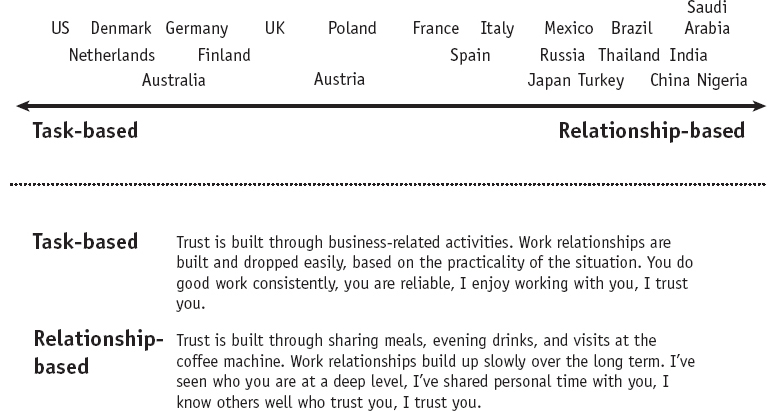
The first strategy is easy. If you are from a task-based society and are hosting people from a more relationship-based society, put more time and effort into organizing meals to be shared. During these meals, spend time getting to know your collaborators personally rather than discussing business
“The more you are willing to remove social barriers in the evening, the more they will see you as trustworthy.”
if you need to contact someone you don’t know, is to use what in Arabic is called wasta, which translates loosely to mean something like “connections that create preference,” “relationships that give you influence,” or “who you know.”
7. Disagreeing Productively
Relax, put your feet up, and start the call with the idea that you might spend several long minutes just catching up before the business talk starts.
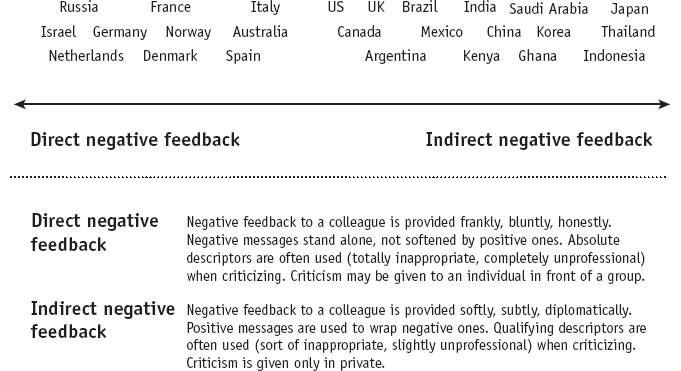
A. In a good meeting, a decision is made.
B. In a good meeting, various viewpoints are discussed and debated.
C. In a good meeting, a formal stamp is put on a decision that has been made before the meeting.
The large majority of Americans responding to this question chose option A. The French, however, largely chose option B. And most Chinese and Japanese selected option C. In many Asian cultures, the default purpose of a meeting is to approve a decision that has already been made in informal discussions. Therefore, the most appropriate time to express your disagreement is before the meeting to an individual rather than during the meeting in front of the group.
To engage in conflict, one does not need to bring a knife that cuts, but a needle that sews
8. Scheduling
monochronic (M-time) cultures and polychronic (P-time) cultures. M-time cultures view time as tangible and concrete: “We speak of time as being saved, spent, wasted, lost, made up, crawling, killing and running out. These metaphors must be taken seriously. M-time scheduling is used as a classification system that orders life. These rules apply to everything except death.”1
By contrast, P-time cultures take a flexible approach to time, involvement of people, and completion of transactions: “Appointments are not taken seriously and, as a consequence, are frequently broken as it is more likely to be considered a point rather than a ribbon in the road
